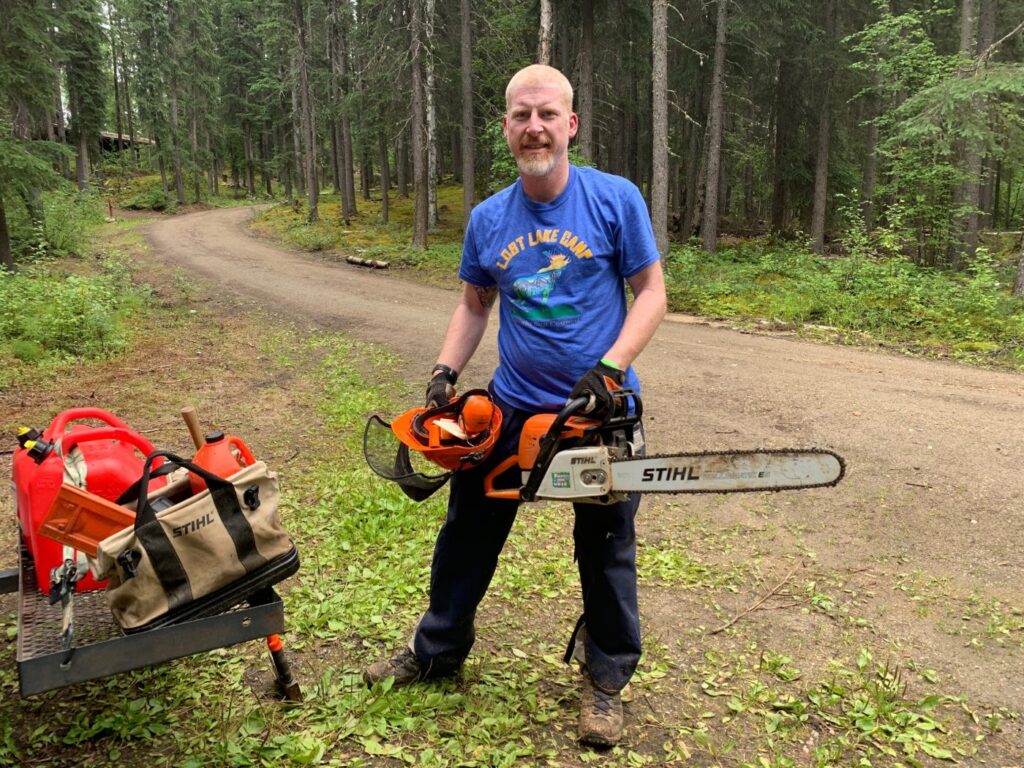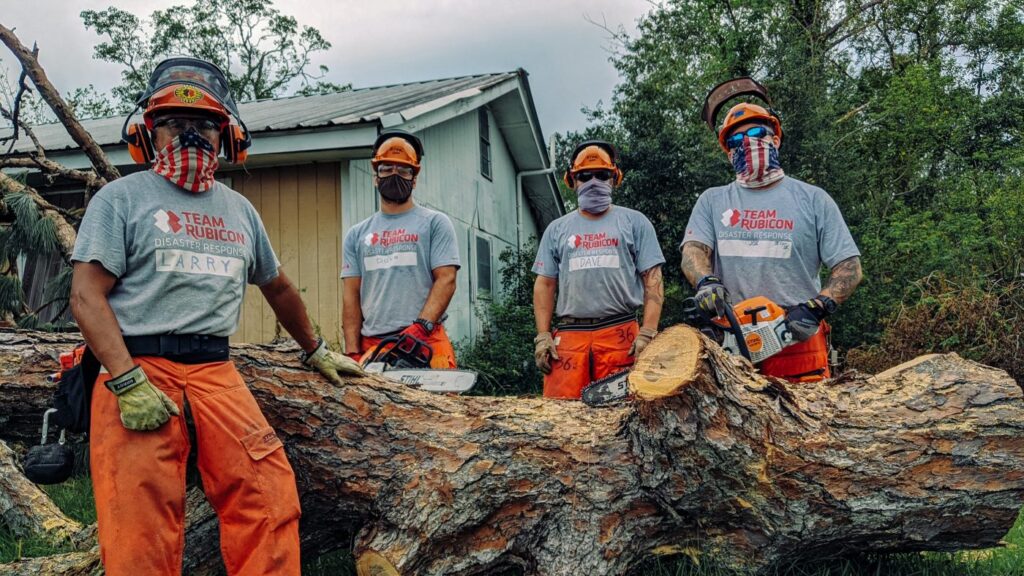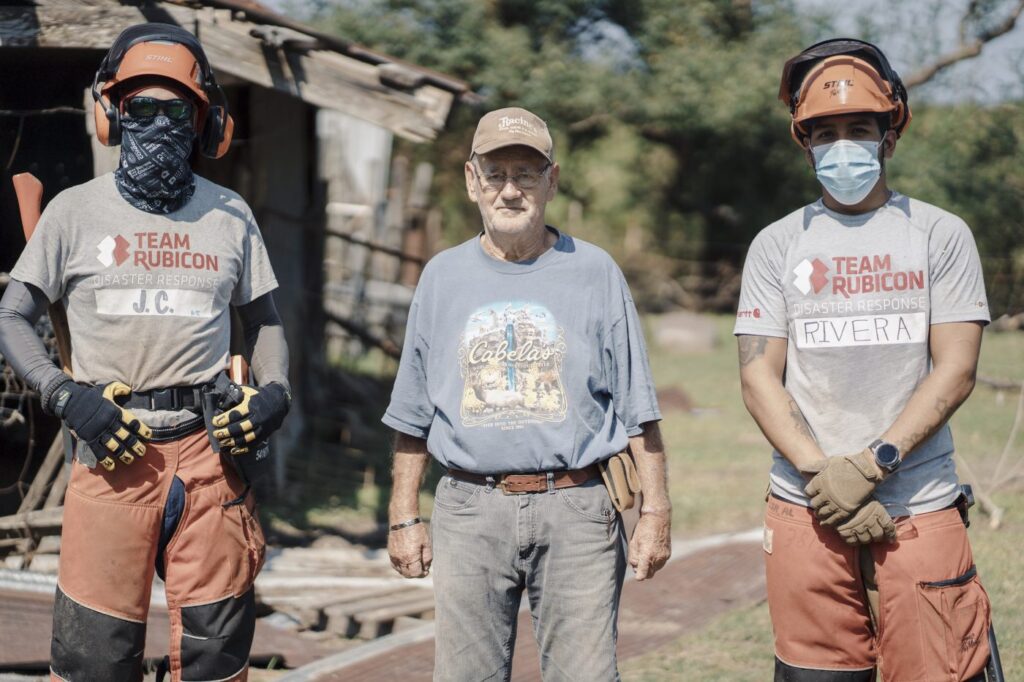Not all Team Rubicon volunteers are veterans, but a large percentage of its more than 150,000 Greyshirts are. For many veteran Greyshirts, discovering the people who they are serving—whether on an official Team Rubicon operation or in the community service they do on the side—has special meaning.
In Alaska, Veterans Serve Veterans—and Themselves
Peter Varney knows what it means to be a fighter. The Air Force veteran admittedly “wasn’t in a good place” when a friend first suggested he get involved in Team Rubicon two years ago, luring him in with the promise that he could “play with chainsaws.” At that time, Varney had been withdrawing himself from friends and community, but his friend’s suggestion piqued his interest. Varney had had plenty of experience working with chainsaws in his years living in Alaska, and he thought this might be something that he could do. That friend’s simple act of reaching out was enough to change his life.
“The big thing I liked about Team Rubicon was the feeling of fellowship,” he said. “We would have something scheduled every month or every couple of weeks, whatever it was, and I knew I could go to that place and hang out with friends.”

As a sawyer, Varney and his team already had projects and trainings lined up into the summer this year, but those quickly vanished when COVID-19 arrived. Varney deployed on a medical support op in April of 2020, but when he returned to Alaska, he found himself missing the camaraderie that had brought him out of the darkness two years earlier.
Rather than letting the new reality of COVID times weigh him down, Varney took action. He took advantage of Team Rubicon’s Neighbors Helping Neighbors initiative, which was launched early in the pandemic, and recruited small groups of friends to do sawyer work in the community. With fire season approaching, there was plenty of it to be done, clearing dead and dying trees to mitigate fire risks. The initiative was popular, and the connections buoyed his spirits.
“Being able to see some of my friends, being able to pretty much get together with Team Rubicon people, even if it’s one at a time or two at a time, and being able to do some service was great,” he said.
A few of the neighbors Varney and crew helped over the summer happened to be veterans, though he hadn’t sought them out specifically because of their service.
“I personally try to feel a connection. With other veterans, you share stories and experiences, so it can be easier to make those connections,” he said. The veteran who often benefited the most from this service, he found, was himself.
“Being able to do projects for some of my friends who are vets has been meaningful to me,” he said. “Even if we haven’t gone to the same place, we’ve felt in the same place. We can relate to the same head space. They helped me much as I might be able to help them.”
Service Opens the Door on Stories
Team Rubicon chainsaw instructor and 2019 Clay Hunt Fellow Larry Montoya has served more than a few veterans on the 26 operations he has deployed on with Team Rubicon, including in Lake Charles, LA, in response to Hurricanes Laura and Delta . When Montoya arrived at a home there in late October of 2020 to remove a branch that had fallen on a roof during the hurricanes he found the work had already been completed. The homeowner, however, was facing other challenges. A large tree on his property posed a risk to the public, and the parish wanted him to remove it. The elderly man, sporting an 82nd Airborne hat, expressed his concerns to Montoya. He was a janitor, he said, and couldn’t afford to remove the tree himself.
Montoya, a former Army infantryman himself, took action. “I sent a message to Ops that the work was done, but the man had other needs that we could take care of,” he said. When Ops gave Montoya and his team the go-ahead, he delivered the good news to the homeowner. They worked for the rest of the day and into the next.

As the team finished up, the man came out to shake everyone’s hands, misty eyed, insisting on giving everyone something for their work. Montoya understood the impulse. Veterans are used to being self-sufficient.
“He was a proud man,” he said. “He didn’t want a handout. But I told him that we were volunteers, and a lot of us were veterans, too. We were happy to do this for him.”
As a veteran, being able to serve other veterans does have special meaning to Montoya, although he’s quick to point out that someone’s veteran status doesn’t affect the level of work being performed. But, he relishes the chance to connect with other veterans, even when on the job.
“It does warm the heart to know I am able to help my brothers and sisters in their time of need. I love to hear their stories from their time in the military,” says Montoya. “When a veteran passes away, it is like a library closed forever—history that should have been shared or passed along to the next generation.”
From Puerto Rico to Pensacola, Speaking the Language of Service
Although the Puerto Rico Public Advocate for Veterans Affairs dramatically scaled back its annual Veterans Day observance in light of COVID-19 concerns in 2020, Team Rubicon’s Puerto Rico State Administrator Juan Ortiz-Giró was one of the lucky few to receive a personal invitation to the event for his “enthusiastic support of veterans on the island.”
It’s only fitting. For years, the Coast Guard veteran and Clay Hunt Fellow has been serving veterans as a matter of routine. Whether he’s delivering food to his elderly neighbors—a Marine Corps veteran and his wife—or helping a local Navy vet get a garden established so that he can sell food from his home, Ortiz-Giró enjoys being of service.
“I love seeing people feel hopeful,” he said. “Usually in disaster work, you see people feeling so hopeless. But when we go in there and take care of business, they can look around their house and see something salvageable, they can see hope. That puts a smile on their face. That’s why I love what I do.”

Though Ortiz-Giró noted that supporting anyone is always worthwhile, he acknowledged feeling “a special bond with veterans.”
On a 2020 operation in Pensacola, FL, in response to Hurricane Sally, Ortiz-Giró had the opportunity to serve a Korean War veteran and his wife who had a tree hanging precariously over their house. Though the man was “strong as an ox,” he had mobility issues that precluded him from doing the work himself, as much as he may have wanted to. Ortiz-Giró felt he was especially equipped to explain Team Rubicon’s work to the man because they had the shared language of the military.
“These people are fighters,” he said, noting that this fighting spirit often makes them reluctant to accept help. But when the help comes from a fellow veteran, it can be easier to take. It’s just part of the deal: you know that your buddy always has your back.
Watch: Larry Montoya reflects on service to country, and to disaster survivors.
The opportunity to serve others when they need it most. That’s what gets our Greyshirts like 22 year US Army Veteran Larry Montoya out in the field.
Larry shares an update from Lake Charles, LA where TR is on the ground right now in response to Hurricane Laura. #BuiltToServe pic.twitter.com/mmfNPGkO6J
— Team Rubicon (@TeamRubicon) October 2, 2020



